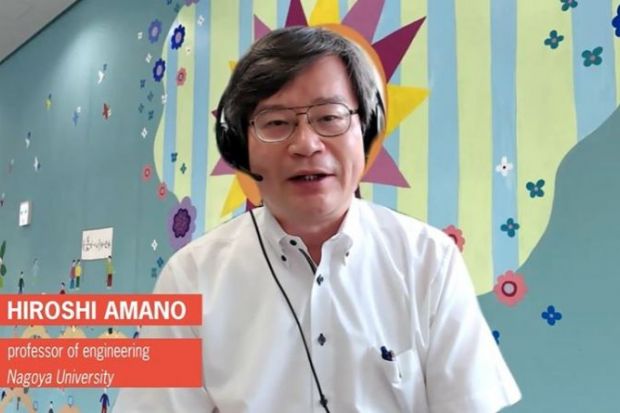Japan must address a major gap between academic research and its application in industry, which is hampering the employability of its PhD graduates, according to a Nobel laureate.
Hiroshi Amano, an engineering professor at Nagoya University, expressed concern that despite Japan’s reputation as a technology leader, it has fewer postgraduate degree holders as a proportion of its total population, and among employees at major corporations, compared with many Western countries.
Only 4.4 per cent of researchers at Japanese companies had doctorates, compared with Austria’s 16.3 per cent, Professor Amano told Times Higher Education’s Asia Universities Summit. “Why do we only have a quarter compared to Austria?” he asked.
He acknowledged that fundamental research took time, highlighting that 30 years passed between when he started his research on light-emitting diodes – which was honoured with the Nobel Prize in Physics in 2014 – and their widespread use in society. “But industry doesn’t want to wait 30 years. It wants results in 10 years,” Professor Amano said.
Employers, for their part, believe that it takes “less effort to hire young researchers and improve and train them within companies than [it does] to hire PhDs” who “may have specialised knowledge in one field but cannot use that knowledge immediately at a company”, Professor Amano told the event.
Nagoya has sought a solution with its “DII collaborative graduate programme”, a five-year PhD focused on accelerating innovation in electronics.
The acronym stands for three types of talent to be trained: deployers (who conceptualise plans for social good), innovators (who oversee product development) and investigators (researchers who seek deeper solutions). At each level, students are paired with mentors from private companies such as Toshiba, Hitachi, Nissan Motor and Toyota.
“Many engineering students had never taken classes in economics or marketing,” Professor Amano said. “Suddenly, their mentors are asking them: who is your customer? Have you done a marketing survey? Where’s your profit and loss statement, or business plan?”
Nakao Iwata, a vice-president at Fujita Health University, told the summit that “economic growth in Japan has slowed over 13 years. I’m very concerned that Japan’s situation is severe. Universities need to be more proactive.”
POSTSCRIPT:
Print headline: Call for closer collaboration: close gap between PhDs and industry, Nobel winner tells Japanese sector
Register to continue
Why register?
- Registration is free and only takes a moment
- Once registered, you can read 3 articles a month
- Sign up for our newsletter
Subscribe
Or subscribe for unlimited access to:
- Unlimited access to news, views, insights & reviews
- Digital editions
- Digital access to THE’s university and college rankings analysis
Already registered or a current subscriber? Login









